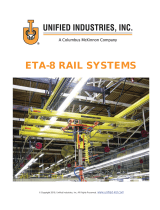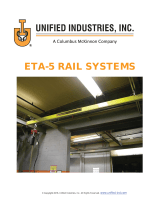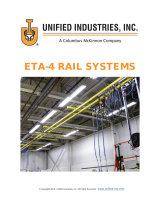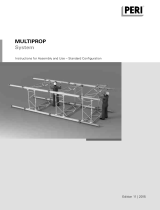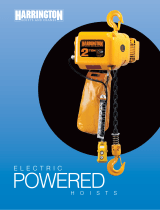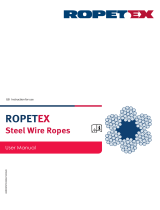Page is loading ...

GB Instruconforuse
!
UMPGT/PPTS220220926GB
POWERTEX
Trolley PGT/PPT-S2
User Manual

2
J
Data
Model WLL Beam width M Minimum radius Weight
(ton) (mm) (mm) (kg)
PGT-S2 0,5 50-135 800 8,0
PGT-S2 0,5 130-215 800 8,8
PGT-S2 0,5 215-300 800 9,6
PGT-S2 1 55-140 1000 12,4
PGT-S2 1 140-215 1000 13,4
PGT-S2 1 215-300 1000 14,7
PGT-S2 2 65-155 1100 18,1
PGT-S2 2 150-230 1100 19,3
PGT-S2 2 230-300 1100 20,5
PGT-S2 3 90-160 1300 30,3
PGT-S2 3 160-230 1300 31,9
PGT-S2 3 230-300 1300 33,5
PGT-S2 5 90-180 1500 46,5
PGT-S2 5 180-230 1500 48,2
PGT-S2 5 230-300 1500 50,6
PGT-S2 10 124-305 2000 94,0
Dimensions
WLL Beam width M A B C D E F G H J L S
(ton) (mm) (mm) (mm) (mm) (mm) (mm) (mm) (mm) (mm) (mm) (mm) (mm)
0,5 50-135 205 198 150 55 30 1,5 – 2 28 8 111 239 27
0,5 130-215 205 278 150 55 30 1,5 – 2 28 8 111 319 27
0,5 215-300 205 363 150 55 30 1,5 – 2 28 8 111 404 27
1 55-140 242 211 174 68 30 1,5 – 2 32 10 118 254 28
1 140-215 242 286 174 68 30 1,5 – 2 32 10 118 329 28
1 215-300 242 371 174 68 30 1,5 – 2 32 10 118 414 28
2 65-155 270 238 194 80 49 1,5 – 2 40 12 147 277 27
2 150-230 270 313 194 80 49 1,5 – 2 40 12 147 352 27
2 230-300 270 383 194 80 49 1,5 – 2 40 12 147 422 27
3 90-160 325 246 234 100 60 2 – 3 49 14 177 287 29
3 160-230 325 316 234 100 60 2 – 3 49 14 177 357 29
3 230-300 325 386 234 100 60 2 – 3 49 14 177 427 29
5 90-180 370 280 267 110 79 2 – 3 59 16 219 320 29
5 180-230 370 330 267 110 79 2 – 3 59 16 219 370 29
5 230-300 370 400 267 110 79 2 – 3 59 16 219 440 29
10 124-305 442 - 396 136 137 2 – 3,5 92 30 190 525 45
Safety factor: 4:1
Dynamic test coefcient: WLL x 1,5
Generally according to EN 13157
G
E
J
S
AL
M
D
H
0,5 - 5t
10t
POWERTEX Geared Trolley PGT-S2 0,5 – 10 ton
Mounting / Instruction for use (GB) (Original instruction)
Read through these user instructions carefully before using the trolley.
Improper operation may lead to hazardous situations!

2 3
J
POWERTEX Push Trolley PPT-S2 0,5 – 5 ton
Mounting / Instruction for use (GB) (Original instruction)
0,25 - 5t
Data
Model WLL Beam width M Minimum radius Weight
(ton) (mm) (mm) (kg)
PPT-S2 0,25 50-152 800 4,6
PPT-S2 0,5 50-135 800 6,8
PPT-S2 0,5 130-215 800 7,6
PPT-S2 0,5 215-300 800 8,4
PPT-S2 1 55-140 1000 11,2
PPT-S2 1 140-215 1000 12,2
PPT-S2 1 215-300 1000 13,5
PPT-S2 2 65-155 1100 16,9
PPT-S2 2 150-230 1100 18,1
PPT-S2 2 230-300 1100 19,3
PPT-S2 3 90-160 1300 28,6
PPT-S2 3 160-230 1300 30,2
PPT-S2 3 230-300 1300 31,8
PPT-S2 5 90-180 1500 44,8
PPT-S2 5 180-230 1500 46,5
PPT-S2 5 230-300 1500 48,9
Dimensions
WLL Beam width M A B C D E F G H J S
(ton) (mm) (mm) (mm) (mm) (mm) (mm) (mm) (mm) (mm) (mm) (mm)
0,25 50-152 188 208 137 50 29 1 – 1,5 28 6 104 27
0,5 50-135 205 198 150 55 30 1,5 – 2 28 8 111 27
0,5 130-215 205 278 150 55 30 1,5 – 2 28 8 111 27
0,5 215-300 205 363 150 55 30 1,5 – 2 28 8 111 27
1 55-140 242 211 174 68 30 1,5 – 2 32 10 118 28
1 140-215 242 286 174 68 30 1,5 – 2 32 10 118 28
1 215-300 242 371 174 68 30 1,5 – 2 32 10 118 28
2 65-155 270 238 194 80 49 1,5 – 2 40 12 147 27
2 150-230 270 313 194 80 49 1,5 – 2 40 12 147 27
2 230-300 270 383 194 80 49 1,5 – 2 40 12 147 27
3 90-160 325 246 234 100 60 2 - 3 49 14 177 29
3 160-230 325 316 234 100 60 2 – 3 49 14 177 29
3 230-300 325 386 234 100 60 2 – 3 49 14 177 29
5 90-180 370 280 267 110 79 2 - 3 59 16 219 29
5 180-230 370 330 267 110 79 2 – 3 59 16 219 29
5 230-300 370 400 267 110 79 2 – 3 59 16 219 29
Safety factor: 4:1
Dynamic test coefcient: WLL x 1,5
Generally according to EN 13157

4
1. Proper usage
Usage:
The trolleys can be used for I-beams with plane anges (such as IPE, HEA or HEB types) or beams with sloping anges (such as INP-beams).
The possible width ranges are shown in the data tables.
The trolley is a rolling and geared chassis for attaching to lifting gear for use inside.
It is not suitable for continuous operation.
It is not suitable for use in rooms where there is a potential risk of explosions.
It is not suitable for use in aggressive atmospheres.
The unit should be installed if possible in a covered room. If it is installed outdoors a roof is to be provided or the unit is to be covered.
Modications to the lifting gear are only permitted with our express consent in writing.
Refer to the technical data and function description.
Safety instructions
Operation and servicing must be left strictly to: authorized, trained personnel.
• Only install the trolley on girders whose load capacity has been checked previously.
• Do not install the trolley on tapered girders.
• Stops on the ends of girders must not be moved or removed.
• Do not transport personnel or allow personnel to be located in the danger area.
• Do not allow the load to swing.
• Do not stand under a raised load.
• Never reach into moving parts.
• Defects are to be rectied immediately by trained personnel.
• Never leave the load off the ground without supervision.
• Loads may only be raised vertically. Do not raise loads at an angle.
• Do not use the trolley to pull items out of other items, release them or drag them sideways.
• The trolley may only be used to push or pull the load.
• Do not exceed the load capacity set out in the technical data.
• Check the raceway width and adjust the distance between the chassis anges using the gures in the table.
• The hand chain is only designed for moving the load attached to the lifting gear and must not be used for any other purpose.
• High strength parts such as the chain, hook and gear parts must not come into contact with free hydrogen, acids, alkalis, vapour or very
aggressive cleaning products. They may become brittle and fracture.
• Conduct a risk analysis before use and verify EC conformity.
• Working temperature: -10°C to +50°C.
The chassis chain (hand chain)
• is only designed for moving the trolley and must not be used for any other purposes.
• must not be used to attach a load.
• must not be drawn over sharp edges.
• must not be twisted.
• Before you use the trolley check that it is correctly mounted on the girder.
• Conduct a visual inspection of the rollers every day. Pay special attention to the lateral play between the raceway girder and the rollers.
• Check that the bolts are secure and that the traverse is secure.
Commissioning
Function description
The roller chassis may only be pulled on the load, the load hook or the load chain of the lifting gear.
The roller chassis is to be attached to a horizontal raceway girder.
The raceway girder must be at and horizontal.
The chassis width may be adjusted by spacing to the relevant girder width.
The chassis is designed without a brake.
The attached load may be moved either by pushing or pulling the load (rolling chassis) or by pulling the hand chain (gear chassis).
The movement speed should be such that the load can be braked by the user at any time.
Assembly and installation of the trolley on the girder
The trolleys can be adjusted to various girder ange widths.
1. Establish the girder dimensions (M) (ange width).
2. Check conformity with the data sheet.
Installation instruction
1. Measure the width of the beam
2. Assemble the trolley with the required number of spacer washers on the carrying axle between the trolley side plates so that that there is a
slight clearance of F mm each side between the trolley’s wheel anges and the beam width. Make sure to have the same number of washers on
each side of the lifting ring so the load is centered There must always be at least one washer on the inside and outside of each trolley side plate
3. The remaining washers need to be placed at the outer side of the trolley side plate opposite to the mounting plate or chain wheel.
4. Fit the trolley on the beam and tighten the mount-plate by hand and make sure all wheels roll on the beam. Tighten the nuts of the mounting
plate with a wrench
5. Load the trolley and move it over the beam to check it runs smoothly. If the wheel anges are too far from the beam or grinding against it, read-
just the trolley by removing or adding washers between the trolley side plates.
Commissioning
Ensure that the chains are correctly positioned; they must not be twisted and must hang freely.
Always refer to the operating manual of the lifting gear you are using.
The open meshing on the drive unit should be greased.
Function test:
Carefully move the chassis to the limit position and check the position of the limit stops.

4 5
Operation
Move the load by pulling the hand chain or by pushing the load.
Do not stand under a raised load.
Media / Recommended lubricants
Recommended lubricant for greasing points:
- Meshing, drive pinion
Multi-purpose grease DIN 51825 T1 K2K
After use the lubricant must be disposed of in compliance with the statutory regulations.
Eye connection/direct connection
The eye connection can be rotated 90° to allow direct connection between hoist and trolley, without
use of hook/eye. Such direct connection must only be made by authorized distributor.
Inspection and servicing instructions
Safety instructions
Remove all the strain from the girder trolley by suitable means before carrying out inspection and servicing work
Instruction Grey Label
To change your new POWERTEX Trolley to Blackline:
If the product should be used in dark environments, add the grey label on the product’s nameplate like this.
The data on the nameplate should ALWAYS be visible, and must NOT be covered.
End of use/Disposal:
After the trolleys have been taken out of use, the parts of the block and tackle
are to be recycled or disposed of in compliance with the statutory regulations.
Disclaimer
We reserve the right to modify product design, materials, specications or instructions without prior notice and without obligation to others.
If the product is modied in any way, or if it is combined with a non-compatible product/component, we take no responsibility for the consequenc-
es in regard to the safety of the product.
EC Declaration of conformity
SCM Citra OY
Asessorinkatu 3-7
FI-20780 Kaarina
Finland
www.powertex-products.com
hereby declares that the POWERTEX product as described above is in compliance with EC Machinery Directive 2006/42/EC & EN 13157.
UK Declaration of conformity
SCM Citra OY
Asessorinkatu 3-7
20780 Kaarina, Finland
www.powertex-products.com
hereby declares that the POWERTEX product as described above is in compliance with the Supply of Machinery (Safety) Regulations 2008 &
BS EN 13157.
Inspection intervals
Conduct an expert inspection
before commissioning Servicing and inspection work
Daily
Visual inspection of rollers (for signs of cracks and deformation)
Visual inspection of the chain
Function of the unit
Adjustment range, visual inspection of the track width lateral play
Quarterly The rollers are tted with ball bearings that are lubricated for life
Every six months
Check the condition of the hand chain (remove sharp edges as they constitute an injury risk)
Check screw connections.
Grease the meshing on the rollers and drive pinion.
Every year Check that the model plate is completely legible.
Have the annual test carried out by an expert
The service life of the unit is limited, worn parts must be replaced promptly by an expert. Contact your dealer for parts in general.
Problem Cause Servicing and inspection work
The girder trolley can only be
moves with difculty.
No grease in the bearings and meshing. Visuel inspection of rollers (for signs of cracks or deformation)
Visual inspection of the chain
Function of the unit
Adjustment range, visual inspection of the track width lateral play
Dirt or other foreign bodies on load girder.
Girder deformed

CertMax+
The CertMax+ system is a unique leading edge certication management
system which is ideal for managing a single asset or large equipment port-
folio across multiple sites. Designed by the Lifting Solutions Group, to deliver
optimum asset integrity, quality assurance and traceability, the system also
improves safety and risk management levels.
Marking
The POWERTEX Trolley is equipped with a RFID (Radio-Frequency IDenti-
cation) tag, which is a small electronic device, that consist of a small chip and
an antenna. It provides a unique identier for the product.
The POWERTEX Trolleys are CE and UKCA marked.
Standard: EN 13157
User Manuals
You can always nd the valid and updated User Manuals on the web.
The manual is updated continuously and valid only in the latest version.
NB! The English version is the Original instruction.
The manual is available as a download under the following link:
www.powertex-products.com/manuals
!
Product compliance and conformity
SCM Citra OY
Asessorinkatu 3-7
20780 Kaarina
Finland
www.powertex-products.com

www.powertex-products.com
/
